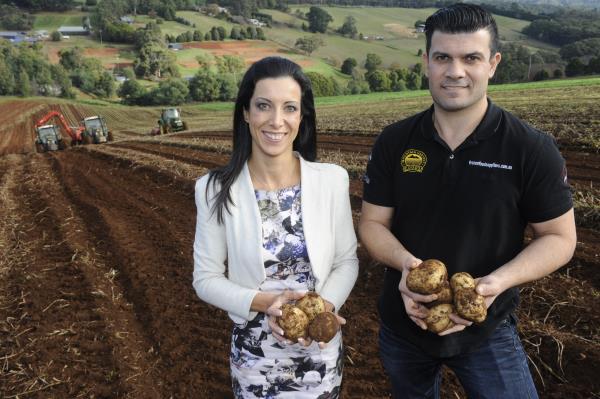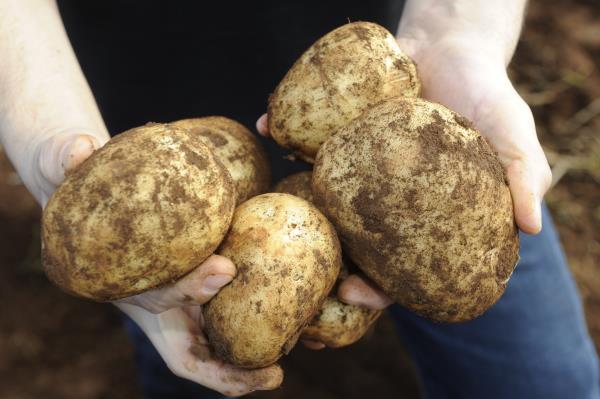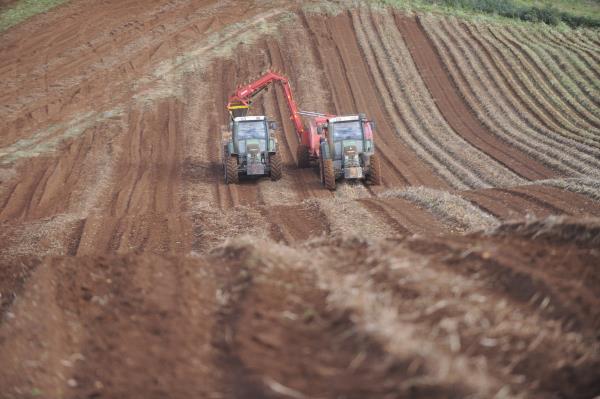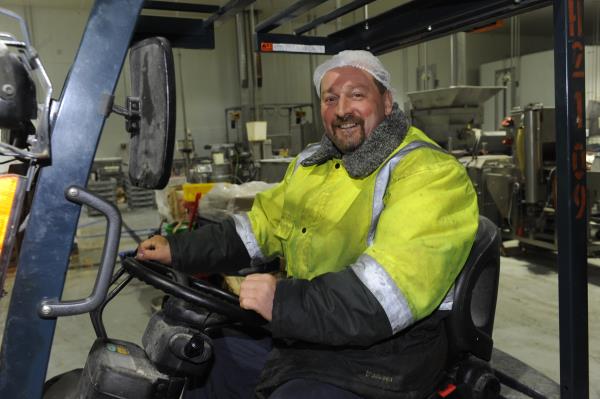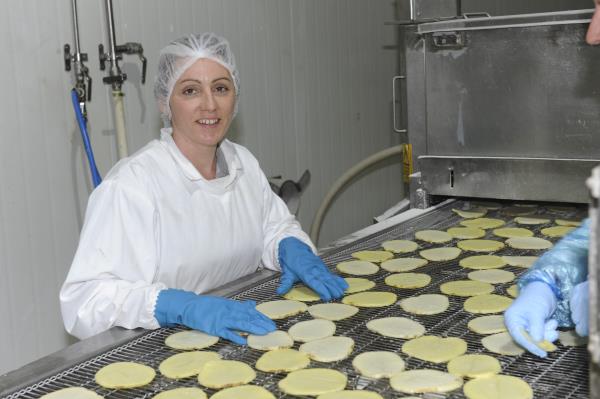By CASEY NEILL
Mountain Harvest Foods in Gembrook has grown from small fry to potato gem in the past five years. Fourth generation farmers Anthony Failla and Christina de Sousa explain to Casey Neill that their success is an opportunity for the whole region.
“If we can all work together as a community we’ll all be rewarded for it.”
ANTHONY Failla didn’t see a long-term future for the family potato farm when he came on board in 2003.
So he built a potato cake factory on the Mountain Road property, bought and relocated two established suppliers and got his sister Christina de Sousa on board.
“We had to make changes,” he said.
“We needed to be able to utilise 100 per cent of all the potatoes that were harvested.
“At that time, our only customer was Woolworths and Woolworths were only taking 70 per cent of all the potatoes we were harvesting.
“They want it perfectly round, they want the right colour, the right soil colour. They only wanted potatoes between 120 grams and 350 grams.
“That’s very hard to achieve.
“This processing factory was an avenue for us to be able to utilise those out of specification potatoes, to the point now where we’re trying to grow more of the out of spec potatoes.”
Farm turnover has grown from $230,000 a year in 2003 to $10 million today.
“I think we can grow that to $30 million in five years,” Anthony said.
They’ll use 7000 tonnes of potatoes this year, up from 1000 tonnes in 2003, and export 8000 cartons of 120 potato cakes each month – from a starting point of 1500.
Mountain Harvest still sends potatoes to the packing house that supplies Woolworths and Aldi, but that now only accounts for half of its spud haul.
Anthony can see that continuing to drop, but the farm’s new ventures will more than make up for it.
There are 12 potato cake manufacturers across Australia and Mountain Harvest has quickly become a leader.
“A lot of our competitors had been in the market for 20 years or more,” Christina said.
“We were the new people on the block with no real experience in food manufacturing.
“Providing a good service, developing strong relationships and marketing the fact we’re farm to plate has really made the difference.
“Through the positive reputation that we had built, a couple of the reps had talked to (national burger chain) Grill’d about our business.
“They had a recipe but they didn’t know who to get to manufacture it or how to manufacture it.
“So Anthony and I met with them and Anthony with his engineering experience was able to develop machinery and a process to do what they needed to do.”
They created sweet potato chip and zucchini fries products that have become permanent menu fixtures across the country over the past eight months.
“We’ve been able to utilise that to further grow the business and to add credibility to what we do,” Christina said.
“We weren’t sure whether it was going to be successful on their menu so we didn’t want to spend thousands of dollars. We adapted the equipment that we had.
“Now that we know it’s a permanent part of our menu, we’re looking at how we can further automate.”
Equipment upgrades are just the beginning.
Mountain Harvest currently sources its sweet potatoes from Bundaberg, Queensland.
“It needs to be a long, warm period to grow sweet potatoes,” Christina said.
“The transport costs are a large part of sweet potato cost at the moment.”
So the farm has this year successfully trialled growing its own.
“Every time we do a test it takes a full year to do a full cycle, so hopefully within the next two or three years we will see sweet potatoes grow in this region, which would be a big achievement,” Anthony said.
“Usually the farmers in Bundaberg have a single process from start to finish which could take up to nine months.
“We would need two processes – one would be hydroponically during the winter months and we would transfer that into the fields to do the final part.
“We’re looking at other vegetable types like zucchini, pumpkins …
“Once we get some volume up, then we can grow here in this local region.
“We want to be able to talk to farmers and understand where they wanna be and what they wanna do and how they wanna do it.
“One of the issues with farming as well is being able to get the volume out to be able to afford the large investment in machinery.
“So there might be an opportunity for us to go into some type of joint-venture arrangement where they would do part of the work and we’d utilise their land and they’d utilise our machinery.”
Anthony said about six other potato farmers remained in the region.
“Diseases in the area made it a bit difficult for farmers to continue on and see a future,” he said.
“Some of them retired, some of the younger generation went and got other jobs.”
Christina said Mountain Harvest was nearing a turning point.
“We also sell a skin-on chip to Lord of the Fries. They’ve got their nine stores,” she said.
“That chip has been presented to some celebrity chefs like Guy Grossi and George Colambaris. They use them in their restaurants.
“We do have to buy potatoes at certain times of the year from other farmers, but that’s going to increase.
“We’re able to fill the majority of our requirement but within a couple of years that’s going to change.
“We’re going to need support from other farmers to work together with us.
“The opportunity is out there.
“It may mean a change in attitude from historical ways of growing.
“If we can all work together as a community, we’ll all be rewarded for it.”
Anthony recently returned from a fact-finding trip to Holland and Belgium.
“There were two aims – one was looking at new farming practices and technology and the other one was looking at automated and state-of-the-art processing equipment for our factory,” he said.
“From that, we’re actually bringing in this year new planting technology which will then reduce the amount of times that we need to pass over our farm land to get our potatoes planted.
“Traditionally it would take us five or six passes of the land to plant our potatoes and now we’ve got that down to two.
“That will enable us to plant our crops faster and have them planted in the timeframe that we need.
“In the past we couldn’t finish planting in the time that we needed to, then we would lose yields because they were planted too late and we weren’t able to get full growth in.
“It also reduces the amount of labour to plant potatoes.
“We’ll be able to reduce our costs of planting dramatically. We’ll be able to grow more with the same labour.
“Our business aim is to reduce our cost of manufacture, our costs of growing, to be competitive with international markets.
“Our aim is not to compete against the cheap and nasty products, it’s actually to be able to get premium prices.”
Anthony wants Mountain Harvest to be seen as an expert in potato farming and the leader in potato processing.
“We also welcome the opportunity for anyone that has a concept – it may just be a simple concept in the kitchen – to try and convert it to mass production,” he said.
“We’ve been successful at achieving that in the past.
“We find it quite challenging and enjoyable to get that final product to market.”
Christina and Anthony’s great grandfather and grandfather bought the farm in 1946.
The family still owns about 700 acres and leases another 200 or so to grow 400 acres of potatoes.
“My grandfather continued farming until the end of his life,” Christina said.
“My dad came to Australia when he was 17 and then worked on the farm with my mum’s dad and met my mum through that.
“I’ve never quite understood my dad’s passion but he just loves watching his little babies grow.
“He’s still daily out on the farm.”
Anthony said: “He will be for a lot of years to come.”
“We’ve accepted that he’ll never really retire,” Christina continued.
“When you live on the farm there is no separation over the years.
“They sent us off for a better life, they didn’t want us to stay on the farm.
“We went off. I did psychology, Anthony did mechanical engineering.”
But they both came back – equipped with new skills and ideas.
“My parents have always been entrepreneurial themselves, so for them to see us taking it to another level, they’re very proud,” Christina said.
“It’s not easy to adapt to change. For them to see a lot of changes going on and for them to be able to roll with it is a real credit to them.”
She joined the caper five years ago, taking on the business, sales and marketing director role.
The 34-year-old mother of two was last month a finalist for the Young Manufacturer of the Year title at the Victorian Manufacturing Hall of Fame.
“I never thought in my wildest dreams growing up as a child that I would be an influential and central part of the business,” she said.
“When they approached me, I was six months pregnant with my second child and then I was basically off on maternity leave, so it wasn’t ever intended to be a big thing in my life,” she said.
“It was maybe something I’d do while the kids were sleeping.
“I didn’t step into it thinking that my heart was going to be taken away with the business, but it was.”
Anthony doesn’t see his operations director role as a job.
“I come to work excited on a Monday morning to be here,” he said.
“I grew up on the farm. I was driving a tractor before I could even touch the pedals.
“To continue that right through to now is amazing.”

